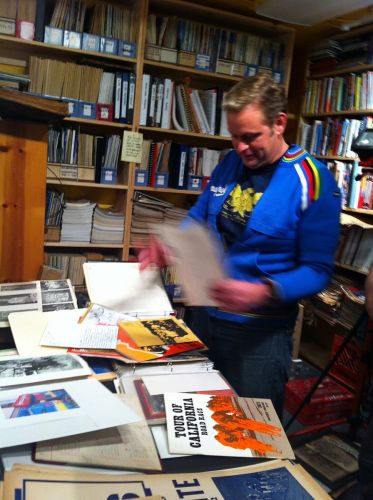SAN FRANCISCO (BRAIN) — When American Cyclery Too's lease expired earlier this year, owner Bradley Woehl decided not to renew. Located directly across the street from the original American Cyclery, the building that housed AC2, as Woehl called it, fell victim to a classic San Francisco syndrome: skyrocketing rents.
"When it was time to renew, the amount discussed was just too ridiculous for any bike shop to afford," said Woehl, who bought American Cyclery and opened AC2 20 years ago. "I offered to buy the building but they didn't accept my offer. But I'm lucky to have a good option with a shop already across the street."
Six-day racer Oscar Juner founded American Cyclery, which is celebrating its 75th anniversary this month, in 1941. Among other things, Juner is known for being the first to ride a bike across the Golden Gate Bridge — and also to be arrested for doing so.
Once a Schwinn "total concept store," the shop later became famous for its selection of modern and vintage components and accessories. And in the early days of mountain biking, riders came from Marin County to root through bins of miscellaneous parts. The shop's basement houses a collection of old magazines, catalogs and Woehl's head badge collection.
Today, American Cyclery carries Giant, Santa Cruz, Public, Bianchi and others, but has carved a niche as a custom build and specialty shop. American Cyclery Too catered to family and urban riders and Woehl said that for many years the two shops worked together to double, triple and quadruple sales. But as consumer habits began to change and overhead increased in the city, it became increasingly more important to run a tighter ship, Woehl said. So when the rent went up, it was a good time to consolidate operations.
"We went through a period where I got talked into carrying more inventory and debt than I wanted to, and I don't ever want to be there again. Bikes just don't get sold that way anymore," he said.
"It seems sad to close but it's not doom and gloom at all. I'm happy to move to calmer waters, run a bit leaner and focus on what we are really good at: on-demand custom builds," he added.
Woehl said the saddest part of the closure is that American Cyclery Too's building, which has been home to a bike shop since the 1970s, will likely be demolished to make way for a new mixed-use development.
"The city is so desperate for housing that they will approve building some condos and tearing down a beautiful 100-year-old building," he said. But Woehl is in the process of registering American Cyclery as a Legacy Business to ensure he'll be able to stay in the neighborhood. Under this designation, businesses and the property owners that rent to them are eligible for grants to help keep longtime businesses from being squeezed out.
Before closing AC2, Woehl moved everything out of American Cyclery and remodeled the 2,500-square-foot store.
"It gave us a chance to give ourselves a nice face-lift, new wiring and a new paint job. We also shrunk the sales floor and expanded service," he said. "I've owned it for 20 years and we hadn't done any of that, so it was a perfect opportunity to get it done."
Since he had to consolidate inventory from two shops, Woehl said American Cyclery looks "nice and stocked," but that he has sold down some product. Woehl also had to reduce his staff from 12 to eight, but said that since he had told employees AC2 was closing well in advance, several found other jobs.
"I didn't have to lay anyone off, and I was so happy that people went on to do really cool stuff instead," Woehl said.
And staffing is another headache Woehl said contributed to his decision to close AC2. A rising minimum wage in the city makes it difficult to hire high school students or interns, but San Francisico's high cost of living has also forced out young people who can't afford to live there.
"Twenty years ago I could have put an ad on Craigslist and would get 50 people looking — students, musicians, etc.," Woehl said. "But none can afford to be here anymore. So it's been tough to find good people and keep them."
Following the consolidation, Woehl said he's looking forward to the future. He's working on a project to build a parklet in the shape of a velodrome in front of the store that will serve as a gathering place for customers and passersby.
"We've got a lot of good things going on. We gave up an appendage business to make the whole business more manageable," Woehl said. "I'm hopeful for the future and positive we will prosper."


